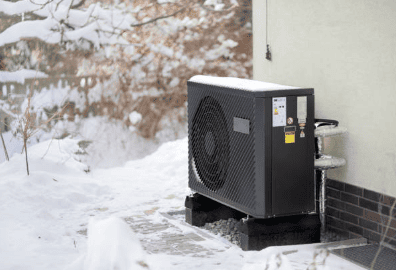It’s a common question for those who want to buy a heat pump, especially where winters are freezing, “do heat pumps work in winter?”.
The short answer is “yes, they do !” but how is it possible? Are they still efficient then? And do they need some special settings in winter?
We are going to answer all of these questions, to make things clearer for you.

How does a heat pump work in winter / cold weather?
Well, a heat pump is like a “reverse fridge”: a fridge takes the inside warmth and releases it outside, whereas a heat pump does the exact opposite.
Indeed, it extracts heat from the air outside (even when it’s cold, some specialized heat pumps can operate in temperatures as low as at -20°C) and puts it inside the house, making it warmer.
Even when it’s freezing outside, the air still contains some kind of energy (warmth and calories). The heat pump catches this energy using a special liquid (the refrigerant) that goes from a liquid state to a gas.
(The refrigerant’s boiling point is around -50°C, meaning it vaporizes even in freezing temperatures).
Then the gas is compressed, which significantly raises its temperature.
At this point, this heat can be delivered to your house.
And finally, the refrigerant cools down and comes back to a liquid state so this process can start all over again.
Are heat pumps really efficient in winter?
When you are wondering “do heat pumps work in winter?” chances are you are also concerned about how efficient they are in cold weather.
The answer is reassuring. Even if extreme cold can, indeed, actually slightly reduce efficiency, most winters (even in the UK) stay within a range where heat pumps perform very well.
In addition, air source heat pumps usually have a COP (Coefficient Of Performance) of 3, which means that they only require 1kWh of energy (therefore, electricity) to produce 3kWh of heat, representing an efficiency of 300% !
Compared to a typical gas boiler, that has an average efficiency of 90%, it’s clearly more cost-effective !
Whereas you have to keep in mind that most of the air source heat pumps are set not to work below -10°C, those extreme temperatures are very unusual in the UK, and heat pumps are designed to keep working in most temperature conditions.
Heat pump savings (UK):
Curious about how much money you could save by installing a heat pump? Here is a comparison of average savings for the two main types used in the UK:
| Type of Heat Pump | Average Annual Savings on Energy Bills (UK) | Average Efficiency (COP) |
|---|---|---|
| Air Source Heat Pump (ASHP) | £500 – £1,000 | ~3.0 (300%) |
| Ground Source Heat Pump (GSHP) | £1,000 – £1,800 | ~3.5 – 4.0 (350–400%) |
Sources
- Energy Saving Trust: https://energysavingtrust.org.uk/is-now-a-good-time-to-get-a-heat-pump?loc=england
Recommended heat pumps settings for winter
Now we know that heat pumps do work in winter, let’s answer a big universal mystery. “Can air source heat pumps actually freeze in cold weather?”
Unfortunately, yes, they can.
But, before closing this page and giving up on the idea of installing a heat pump, you should know that if you follow these essential tips, there is no reason your heat pump should freeze, even in extreme colds.
- First of all, you need to make sure to perform regular maintenance, preventing any possible issue.
- To ensure your air source heat pump doesn’t freeze, and to enhance its efficiency in extreme colds, you can consider getting a Low ambient kit for your heat pump, avoiding any winter problem.
To learn more about Low ambient kits:
-> https://hvac.science/heat-pump-low-ambient-kit/ - Then, if you are suspecting your heat pump to freeze, you can check on your air source heat pump’s defrosting cycle. Make sure that it’s working (it should happen multiple times a day during winter).
To read about how to check defrosting cycles:
-> https://tbyrdhvac.com/heat-pump-defrost-cycles/ - Finally, the best way to take care of your heat pump and ensure it operates at peak efficiency is still to read the owner’s manual (you can easily find it on the internet by searching the name and model of your heat pump).
- But if you need extra reassurance, if you are living in a region that faces extreme conditions during winter (with a temperature less than -10°C), some systems are also designed with a backup heat source such as an electric resistance heater or a boiler.
FAQ
Should I turn off my heat pump during winter?
Not at all ! Air source heat pumps and ground source heat pumps are designed to function even in cold weather.
Can a heat pump freeze in winter?
Yes if it has an issue (especially during the defrosting cycle), or if the temperature goes under -10° C (as most models are not designed to operate below this temperature). But in most of the cases heat pumps work like magic.
Should I turn off my heat pump at night?
Absolutely not ! Just like in winter, air source heat pumps and ground source heat pumps are designed for this.
Once installed, it requires little to no intervention.
Can a heat pump work below freezing?
Yes ! It usually works at temperatures as low as -10°C, but some models can work until -20°C !
Can I still get government help to install a heat pump in winter?
Yes ! In winter, just like the rest of the year, you can ask for government grants (such as the Boiler Upgrade Scheme) and receive up to 7 500£ to install a heat pump.
To sum up, yes heat pumps work in winter!
They are not only effective in winter, but they are also a long-term investment that helps reduce your energy bills.
-> If you’re considering installing one and would like tailored advice, feel free to contact us !
Leave a Reply